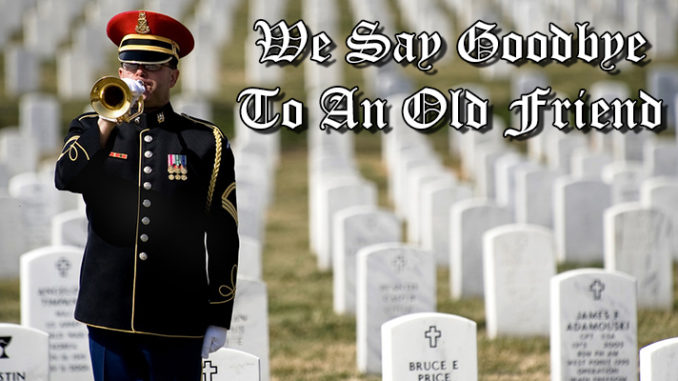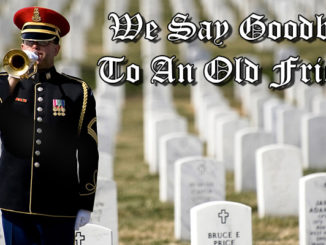
THE LAST GOOD-BYE
PAUL VOGLE (1932 – 2001)
UNITED PRESS INTERNATIONAL
WAR CORRESPONDENT IN VIETNAM;
VICE-PRESIDENT (OPERATIONS)
MILITARYCORRUPTION.COM
By MAJ GLENN MacDONALD
U.S. Army Reserve (Ret.)
© 2001 MilitaryCorruption.com
More than anything else, I think what I’ll remember the most about Paul Vogle was his kind and gentle nature.
I first met Paul when I was a young war correspondent in Vietnam, more than 30 years ago.
A former U.S. Army combat correspondent in Vietnam, (1966-to-1969), I’d returned to that tortured land two years later as a civilian newsman. And my first memories of Paul were of his decency, compassion for the Vietnamese people, and his warm, friendly way of helping anyone who asked for it.
In a press corps filled with every type of personality, Paul’s kindness stood out like a shining light on a dark night. I never heard him say a “bad word” about anyone.
RESPECTED BY HIS COLLEAGUES
“Paul Vogle was a rare individual. The type of gentle soul one can never forget,” said famed Associated Press Vietnam correspondent George Esper. “There will never be another like him,” said friend and UPI colleague, Chad Huntley, (Vice-President for News at MilitaryCorruption.com). And MCC Editorial Director, Dan Cameron-Rodill – who, with newsman Eric Cavaliero, risked his life to man the CBS NEWS Bureau in Saigon when Vietnam fell to the Communists in 1975 – perhaps put it best when he said: “To know Paul was to realize there was still something and someone good and decent among all the depravity of a war that ripped Vietnam apart. His unselfishness and high degree of professionalism is what I will remember the most.”
Only Matt Franjola of The AP, could come close to speaking and understanding Vietnamese as well as Vogle. Correspondents fluent in the language were rare indeed during the more than ten years the United States military was fighting in Vietnam.
His ability to simultaneously translate from Saigon Radio and write a story on the UPI wire was legendary.
One evening in 1971, I got to see his skill firsthand.
In UPI’s old Saigon bureau, at 19 Ngo Duc Khe Street, just off Tu Do, I watched Paul, headset plugged into a transistor radio tuned to a speech by Vietnamese President Nguyen Van Thieu, bang out a story on the teletype in “real time.”
A half-full glass of Scotch on his desk, and a cigarette hanging from his lips, Paul was the picture of intensity as he composed the article instantaneously in his mind. As I peered through the clouds of smoke, I knew that what I had seen was one of the most valuable, if not THE most valuable, asset UPI had during the entire Vietnam war.
He had first come to Vietnam 18 years earlier, a young American soldier and honor graduate of the U.S. Army Language School at Monterey, Calif. A master of the difficult-to-learn Vietnamese language, Paul took his service discharge in Vietnam and became a professor of English at Hue University.
A series of newspaper jobs, including associate editor of the English-language Saigon DAILY NEWS, led to a permanent slot with UPI in 1967. Used to “pinch-hit” at other Asian bureaus like Phnom Penh, Cambodia and Vientiane, Laos, Paul proved invaluable as he literally worked around the clock for United Press International. At one point, he lived in the apartment above the news bureau’s office so he could be available at any hour of the day or night. The Scotch and cigarettes were never far away.
While he could have made more money working for the competition, his friends, his “family,” was at UPI, and he was not about to leave them.
LAST PLANE OUT OF DANANG
Journalists can work a lifetime and never get that elusive “BIG story,” the one that splashes your byline across the front page, “top fold,” of the New York TIMES or leads every evening broadcast on television network news. But Paul Vogle did, and it nearly cost him his life.
It was March 1975. The final victorious Communist offensive was sweeping down the length and breadth of South Vietnam. Da Nang, the country’s second-largest city, was about to fall, and UPI sent Vogle to cover the final moments.
Ed Daly, the pistol-packing, tough-talking president of World Airways, was sending two of his 727 airliners north to pick up refugees from the terror-stricken Vietnamese port city.
The scene at the former U.S. air base there was one of utter chaos. Thousands of panicked civilians as well as deserting South Vietnamese troops lined the 10,000-foot asphalt strip.
World Airways chief pilot Ken Healy first made a low-level pass over the runway, then decided to set the bird down while the other aircraft circled overhead. That’s when all hell broke loose.
The plane taxied toward the old Air Vietnam ramp where civilians were anxiously waiting. But suddenly, jeeps and other vehicles full of angry South Vietnamese soldiers, chased the plane, it’s ramp open to the tarmac.
The deserting troops tried to fight their way aboard, ahead of screaming Vietnamese women and children. They knew this was the “last flight” out of Da Nang.
Vogle described the frenzy into his cassette tape recorder:
MOBS OF PEOPLE ARE PUSHING AND SHOVING, THOUSANDS TRYING TO GET ABOARD. THE PLANE IS TAXIING AWAY FROM THE MOB.
THE CREW IS SCARED. THE MOB IS PANIC-STRIKEN. THERE’S A MAN WITH AN M-16 (RIFLE) POINTED AT US, TRYING TO GET US TO STOP.
WE’RE LOADING MORE PEOPLE. THE PANICKED CROWDS ARE RUNNING AFTER US. WE JUST PASSED A POTHOLE IN THE RUNWAY. A JEEP, A PICK-UP TRUCK, JUST CRUMPLED UNDER AN ENGINE . . . THEY’RE IGNORING THE ENGINES … PEOPLE ARE GRABBING AT THE STAIRS.
SOLDIERS ARE RUSHING THE PLANE RIGHT NOW. DALY IS AT THE BOTTOM OF THE RAMP. HE’S TRYING TO PUSH THE SOLDIERS BACK. WE’RE BEING MOBBED!”
[At this point, Vogle’s humanity shines. He stopped being a newsman long enough to shout to the wild crowd in Vietnamese: IT’S ALL RIGHT. IT’S ALL RIGHT. WE’VE GOT ROOM FOR EVERYBODY. DON’T PANIC.” But the mob is crazed with fear. They continue to claw at the ramp. The huge mass of people weigh heavily on the stairs, and the plane is in danger of being over-whelmed and unable to take-off.]
MEN WITH GUNS ARE FIGHTING EACH OTHER. THE PILOT GOOSES THE ENGINE.
[The roar of screeching jets in the background can be heard as Healy keeps the plane moving.]
PEOPLE ARE STORMING ABOARD, SHOUTING . . . PUSHING . . . SOLDIERS, CIVILIANS. PEOPLE ARE CLIMBING UP ON THE WINGS NOW . . . THEY’RE FALLING OFF!
SOLDIERS ARE FIRING INTO THE AIR TO SCARE OTHERS AWAY . . . WOMEN AND CHILDREN ARE LYING ON THE GROUND. SOME ARE TRYINGTO LIE IN FRONT OF THE WHEELS!
[The engine noise picks up, and Vogle is now screaming into his recorder:]
A MAN JUST FELL OFF THE RAMP . . . I SEE A BODY, COVERED IN BLOOD. THEY’RE (THE VIETNAMESE) HANGING ONTO THE STAIRS, BUT ARE FALLING OFF AS WE TRY TO GET AIRBORNE.”
Healy threw the throttle, and the over-loaded jet surged into the air, headed for the temporary safety of Saigon.
DISARMING THE SOLDIERS
In his superb book – “55 DAYS: THE FALL OF SOUTH VIETNAM” – former UPI Saigon Bureau Chief Al Dawson described what happened next.
“The soldiers were armed. Vogle and Daly moved up and down the rows of people, stepping over the troops. Vogle asked a man for his rifle. The soldier looked at him with a blank face. Vogle realized he was stunned, virtually comatose. The newsman reached down and plucked the rifle away. He made his way from man to man, taking rifles, pistols, grenades, ammunition.”
Somehow the stricken aircraft landed at Saigon’s Tan Son Nhut Airport, the body of a South Vietnamese soldier, hanging from one of the plane’s wheel wells.
EYEWITNESS TO HISTORY
So dramatic and vivid was Vogle’s UPI wire story that made PAGE ONE across the world, that – for those who were not privileged to know him or to read it then – we reproduce here, in part, his words, as Paul described one of the most momentous stories of the Vietnam war.
By PAUL VOGLE
DA NANG, MARCH 29 (UPI) – Only the fastest, the strongest, and the meanest of a huge mob got a ride on the last plane from Da Nang Saturday.
People died trying to get aboard and others died when they fell thousands of feet into the sea because even desperation could no longer keep those fingers welded to the undercarriage.
It was a flight into hell, and only a good, tough American pilot and a lot of prayers got us back to Tan Son Nhut air base alive – with the Boeing 727 flaps jammed and the wheels fully extended.
. . . When we touched down, the troops who had stormed us were offloaded and put under arrest. They deserved it.
A mangled body of one soldier, M16 rifle still strapped to his shoulder, was retrieved from the undercarriage. He got his ride to Saigon, but being dead in Saigon is just the same as being dead in Da Nang.
Over a score of others came out of the baggage compartment, cold but alive. Somebody told me that four soldiers crawled out of the wheel wells alive. One died.
The last plane from Da Nang was one hell of a ride. For me. For Ed Daly. For Ken Healy. For the soldiers. And for two women and a baby.
But the face that most remains in my memory is that of an old woman lying flat on the tarmac seeing hope, seeing life itself, just off the end of her fingertips and rolling the other way.
NEVER TO BE FORGOTTEN
If there is a God and Heaven above, and I believe there is, Paul is looking down on us now, a smile on his face to know he has not been forgotten.
He will never be forgotten, not as long as one Indochina war correspondent lives on to tell the tale of UPI’s “essential” man, the calm in the eye of the storm – Paul Vogle, journalist “extraordinaire.”
In the years since that fateful flight out of Da Nang, Paul worked for UPI Bureaus in Bangkok, Hong Kong and Detroit, Michigan.
He retired four years ago in Plymouth, Mich. and looked forward to spending more time with his beloved family – his Vietnamese wife Kim, daughter Tanya, and sons Kiet and Tuan. He was especially proud of Tuan, a corporal in the United States Marine Corps.
When MilitaryCorruption.com was born last year, Paul became vice-president for operations. Despite age and ill health, Paul was enthusiastic and supportive of our investigative journalism. Never once did he complain about pain or problems. It was his nature to cheer others and not be concerned with himself.
It was late summer in 2000 when Paul, a lifelong heavy smoker, was diagnosed with lung cancer. He reluctantly told me about it during one of our many phone conversations. Proud of his German heritage, he remained stoic and optimistic. When my old friend and former AP colleague Peter Arnett phoned him unexpectedly one day, (I’d told Arnett about the diagnosis) Paul was happy for weeks.
“Glenn, it was so good hearing Peter’s voice again! God, the memories came flooding back,” he told me. “Thank you all for remembering me.”
Thank YOU, Paul, for making our lives a little better to have known you.
[EDITOR’S NOTE: Glenn MacDonald, a veteran journalist here and overseas, last worked for United Press International out of the New Jersey, Philadelphia and New York Bureaus. He retired from the U.S. Army Reserve as a major in 1999, some 33 years after he enlisted to go fight in a place called Vietnam.]

